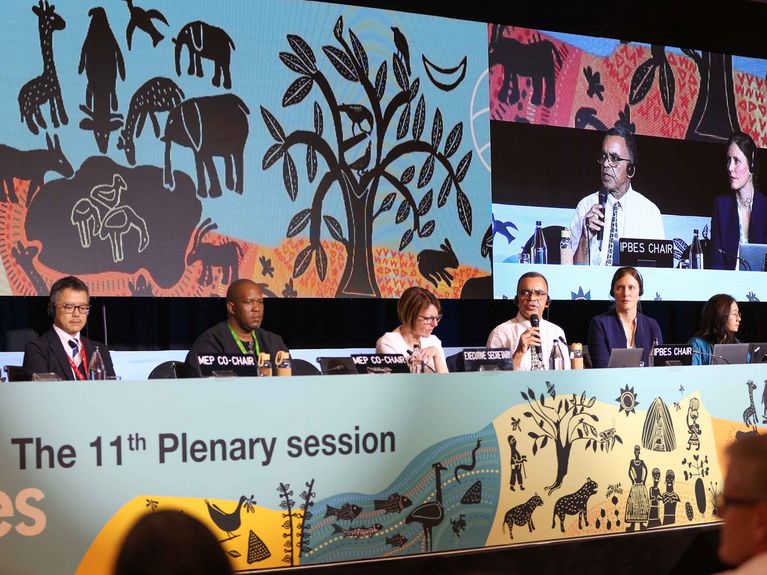
Story #19
We Share Our Knowledge – with Politicians, the Business World and Society
Our expertise, latest findings and proposed solutions aren’t just for us; our goal is to share them with society – the media, companies, politicians and normal citizens – as quickly as possible. To make that happen, we offer a range of services – in which we inform, explain, advise, discuss and debate, collaborate – and listen.
How safe will my village be from flooding in the future? Will Alzheimer’s be treatable someday? How can we preserve our planet’s biodiversity? The research pursued at Helmholtz focuses on the greatest challenges facing society. But by working together, we also want to ensure that our knowledge is effectively shared with others. To do so, our research centers offer a broad range of initiatives.
For example, we provide more than 80 different information services to advise citizens, communities and companies. They offer support ranging from individual talks – e.g. in the case of our cancer information service, our largest advising office – to digital information platforms for the general public, like our frequently used, daily updated UFZ Drought Monitor for Germany. Our earthquake service and crisis information service are specialized in natural disasters, while Gerics and our four regional Climate Offices provide urban planners and farmers, coastal communities and companies with advice on how to prepare for the impacts of climate change.
In addition, our research centers open their doors for interested parties, e.g. through lab participation opportunities for schoolchildren or Citizen Science projects, which allow average citizens to contribute to real research.
Our researchers also get in touch with the media on a regular basis: as expert consultants, they share information on e.g. the latest research findings or raise awareness for topical, pressing questions, e.g. during the COVID-19 pandemic or in discussions on the potential and risks of AI applications. They are also frequently cited as experts in newspapers, online media, radio and television.
Another main focus is on providing scientifically sound advising for political decision-makers: researchers from our Centers serve on expert committees for municipalities, federal states, and the Bundestag – which is also where you’ll find the Office of Technology Assessment (TAB), which offers information on the benefits and risks of new technologies – from climate-friendlier air travel to the future of fusion reactors.
Our experts also engage in international political advising – both at the EU level and in the major international committees of the United Nations. For example, the Helmholtz Centre for Environmental Research (UFZ) has played a major part in the Intergovernmental Science-Policy Platform on Biodiversity and Ecosystem Services (IPBES) since 2012, the year the latter was founded. The IPBES focuses on a key issue for the future – the preservation of biodiversity and ecosystem services. Dozens of UFZ researchers have contributed their expertise to the work done at the IPBES – as authors, lead authors, or coordinating lead authors. Its Global Assessment Report on the state of the environment, released in 2019, was in part coordinated by a UFZ expert, who served as Co-Chair.
The UFZ’s participation has yielded regional and thematic Assessment Reports that are based on the review, assessment and prioritization of thousands of scientific studies, as well as indigenous knowledge, that present the “state of knowledge” regarding the loss of biodiversity and ecosystem services, and that outline ways to reverse this negative trend. Further, to help politicians quickly familiarize themselves with specific topics, we also publish summaries tailor-made for them. In this way, our researchers provide decision-makers around the globe with objective and reliable information, which can e.g. serve as a common basis for discussion when binding agreements at the global, European or national level are to be negotiated.
Bild: IISD/ENB | Kiara Worth
Participating centers
- AWI
Alfred Wegener Institute, Helmholtz Centre for Polar and Marine Research
- CISPA
CISPA Helmholtz Center for Information Security
- DESY
Deutsche Elektronen-Synchrotron DESY
- Jülich
Forschungszentrum Jülich
- Geomar
GEOMAR Helmholtz Centre for Ocean Research Kiel
- GFZ
GFZ Helmholtz Centre for Geosciences
- GSI
GSI Helmholtzzentrum für Schwerionenforschung
- DLR
German Aerospace Center
- DKFZ
German Cancer Research Center
- DZNE
German Center for Neurodegenerative Diseases
- HGF
Helmholtz Association
- UFZ
Helmholtz Centre for Environmental Research – UFZ
- HZI
Helmholtz Centre for Infection Research
- Munich
Helmholtz Munich
- HZB
Helmholtz-Zentrum Berlin für Materialien und Energie
- HZDR
Helmholtz-Zentrum Dresden-Rossendorf
- Hereon
Helmholtz-Zentrum Hereon
- KIT
Karlsruhe Institute of Technology
- MDC
Max Delbrück Center
-
Max Planck Institute for Plasma Physics (Scientific associated Partner)